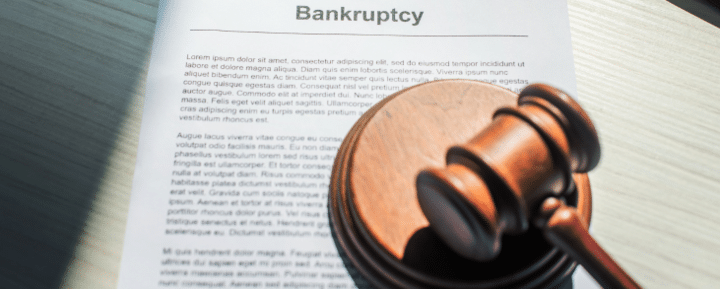If you’ve been sued over a debt, filing for bankruptcy could stop the lawsuit from progressing. However, other types of lawsuits may not be impacted, and in some cases, it may not completely resolve the original legal action.
Before you consider bankruptcy, it’s important to understand the impact it can have and research some alternatives. Here’s what you need to know.
Understanding Bankruptcy and Lawsuits
When you file for bankruptcy, the court grants an automatic stay, which is an injunction designed to protect you and your assets. More specifically, the automatic stay is imposed against certain creditors who may be trying to collect money from you.
Can a Bankruptcy Stop a Lawsuit?
For the most part, the automatic stay granted by a bankruptcy court includes lawsuits filed against you by debt collection agencies and other creditors.
That said, there are some exceptions to the rule. Here are some situations where a creditor may ask a judge to lift an automatic stay:
- The basis for the lawsuit is that you committed fraud.
- The outcome of the lawsuit won’t affect the bankruptcy case, and the creditor faces financial harm.
- The lawsuit will decide an issue that must be resolved to determine the debt’s eligibility for discharge.
Types of Lawsuits Affected by Bankruptcy
While there are some types of lawsuits affected by an automatic stay, there are others that won’t be impacted at all.
What Types of Lawsuits Will Bankruptcy Stop?
In general, bankruptcy may stop certain civil lawsuits that involve a potential debt. Examples include:
- Credit card debt
- Home foreclosure
- Deficiency balances
- Breach of contract
- Financial dispute between business partners
- Eviction before the state issues an order for possession
- Personal injury cases
What Types of Lawsuits Are Not Stopped by Filing Bankruptcy?
In addition to some of the exceptions listed above, there are some types of lawsuits that bankruptcy won’t have an impact at all. Examples include:
- Criminal cases
- Divorce and other dissolutions
- Child custody and support suits
- Most evictions after the state has issued an order for possession
Can Bankruptcy Clear Debt Based Lawsuits?
If you’re being sued over a debt that qualifies for discharge, filing bankruptcy could eliminate the debt, resulting in the lawsuit going away.
That said, your eligibility for discharge may depend on the type of bankruptcy you choose and your financial situation. If you file for Chapter 13 bankruptcy, for instance, you may be required to repay some or all of the debt with a restructured repayment plan.
With Chapter 7 bankruptcy, you may need to liquidate some of your assets to pay off some of the debt before the remainder is wiped out.
Dischargeable vs. Non-Dischargeable Debts
The good news is that most consumer debts can be discharged in bankruptcy. Here’s a list of examples:
- Credit card balances
- Medical bills
- Personal loans
- Payday loans
- Unpaid utilities
- Phone bills
- Deficiency balances after repossession or foreclosure
- Some personal liability on secured debts
- Court judgments
- Tax debts that are more than three years old
- Certain student loan debt
On the flip side, these debts typically aren’t eligible for discharge in bankruptcy:
- Tax debt from the past three years
- Child support
- Alimony
- Other divorce-related debts
- Court fines and penalties
- Money owed to the government
- Debts from personal injury you caused while driving under the influence of drugs or alcohol
Can Bankruptcy Remove a Judgment Lien?
If a creditor has sued you and received a judgment in their favor, they’ll typically file a judgment lien against your assets to satisfy the court order. But while you can’t stop a completed lawsuit with bankruptcy, you may be able to eliminate the judgment lien.
Here’s what needs to happen for that to be the case:
- The lien must stem from a judgment against you in favor of a creditor.
- The lien does not involve past-due child support or alimony payments.
- The property in question is eligible for exemption in bankruptcy.
- The lien in question would impair your exemption.
It’s important to keep in mind that judgment liens don’t go away on their own during the bankruptcy process. In fact, if you neglect to take action, a lien may survive the bankruptcy process and remain in force.
Alternatives to Bankruptcy
While bankruptcy may seem like an appealing way to get out from under a lawsuit, it may not always be the best path forward. Here are some other potential options to consider.
Negotiate with Your Creditor
Even after filing a lawsuit, creditors may be willing to work with you to settle the debt for less than what you owe. You can try to negotiate on your own, which can be challenging or you can enlist the help of an experienced debt attorney who can negotiate on your behalf.
Fight the Lawsuit
If you have good reason to believe that you can win the debt lawsuit, it may make sense to see it through rather than trying to eliminate it in bankruptcy. Some of the reasons to consider challenging a lawsuit include:
- You’ve already paid the debt
- The debt doesn’t belong to you
- Details of the debt are inaccurate
- The statute of limitations on the debt has passed
You may even be able to file a counterclaim against the creditor if you can provide evidence that the creditor violated your consumer rights laid out in the Fair Debt Collection Practices Act.
Pay the Debt
If you don’t dispute the details of the debt and you can afford to pay it, doing so could end the lawsuit and prevent any judgments against you.
Common Questions About Bankruptcy and Lawsuits
Does Filing Bankruptcy Stop All Civil Lawsuits?
No, not all. Bankruptcy will grant an automatic stay only when the lawsuit in question involves a debt that qualifies for discharge in bankruptcy. Even then, there may be some exceptions to the rule.
Should I Fight the Debt Collection Lawsuit or File Bankruptcy?
Take some time to evaluate your situation and research your options to determine which one is the best for you. For example, if you have sufficient evidence to refute the creditor’s claims or even to file a countersuit, it could make sense to move forward with responding to the lawsuit.
However, if the underlying debt is legitimate and you can’t find a way to make other alternatives work, filing for bankruptcy may be worth considering. Be sure to consult with a credit counselor or bankruptcy attorney to get some personalized advice for your situation.
Can You File for Bankruptcy After Losing a Lawsuit?
Yes, it’s possible to file for bankruptcy even after you’ve had a judgment entered against you. In some cases, you may even be able to eliminate the judgment lien associated with the suit.
Does Bankruptcy Stop Wage Garnishment?
Yes, in addition to a pending debt lawsuit, the automatic stay granted upon filing bankruptcy also applies to wage garnishment.
The Bottom Line
If you’re being sued by a creditor, filing for bankruptcy could stop the lawsuit from progressing. However, it won’t necessarily resolve all legal actions against you. What’s more, bankruptcy may not be the best way to handle the situation.
At Tayne Law Group, a New York-based debt relief law firm, we’ve been helping clients find debt resolutions for over 20 years. If a creditor is suing you, we can help you develop a strategy to resolve your debt and avoid filing an unnecessary bankruptcy. Tayne Law Group works with clients with business and consumer clients to resolve debt like credit card debt, MCA debt, Student loan debt and other business related loans.
Give us a call at (866) 890-7337 for a free phone consultation with our experienced and helpful staff. You can also fill out our short contact form, and someone from the office will contact you. We never sell or share your information and all discussions are confidential. All work is done by our in-house team at the Tayne Law Group, P.C.





